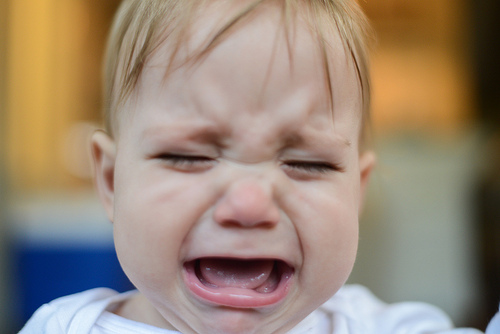Breathing is part of living, so much so we hardly notice it is happening. We often take it for granted until something makes it difficult. Sometimes children have a hard time taking air in, making it a concern for parents. Labored breathing in baby is dreaded by everyone, as babies are so much more fragile than we are. Watching as your child having difficulty breathing can be a scary thing. Most of the time, the cause of labored breathing is a short-lived infection or another minor issue with the child's lungs. Most likely, it will resolve with time and proper medical attentions.

Possible Reasons of Labored Breathing in Babies
1. Fever
Children often breathe fast when they have a fever as a way to dispel heat. Sometimes, it may be so fast it looks like panting. In this case, even if there is a lack of other respiratory symptoms, give your child fever reducing medication. Wait about an hour for the fever to go down and then see if the breathing has gotten better.
2. Croup
When your child's voice box is affected by a cold virus, it is considered croup. Symptoms of croup include a cough sounding like a dog bark, caused by swelling and inflammation of the area. The voice box gets so irritated it causes stridor, which is a noise caused by your child attempting to breathe. The sound can be heard when your child is awake or asleep. One home remedy for croup is sitting in a hot steamy bathroom. However, if the cough or stridor gets worse, take you child to the emergency room.
3. Pneumonia
Labored breathing in babies can be caused by pneumonia. The symptoms of this illness include a bad cough, cold-like symptoms, high fever and difficulty breathing. If your child develops any of these symptoms, call you doctor for an immediate appointment.
4. Congested Nose
Your child might have trouble breathing if he/she has a stuffy nose. Newborns often have a congested nose for many weeks after birth. Try alleviating your child's discomfort by using spraying saline in the stuffed nose and then use a bulb syringe to suction out.
5. Wheezing
Wheezing is commonly heard in newborns and young babies because of saliva build-up or milk that has been regurgitated. If this is the cause, there is little need for worry. However, if severe wheezing is occurring for an extended period of time and is accompanied by labored breathing, you should contact your doctor right away and possibly go to the emergency room.
6. Asthmatic Breathing
Another reason there is labored breathing in babies is asthma. When this is the case, the breaths are often squeaky or high-pitched. You may also witness caving in the abdomen, neck or ribs with each breath taken. If you know your child has asthma, you probably have directions on how to treat it. If you are not sure, evaluate the situation and if you feel the need, go to urgent care or the closest emergency room.
7. Chest Congestion
Chest congestion is common in babies and young children as they have a hard time coughing up phlegm and regurgitated milk. You can sit with your child in a steamy bathroom to break up the congestion. Also, letting your baby sleep in an upright position, like in a car seat, can help relieve discomfort.
Signs of Labored Breathing in Babies
Signs to look for in labored breathing babies that warrant further evaluation include:
- Blue or grey color of lips
- Grunting breathing noises
- Nostrils flaring with breathing
- Whistling noise (wheeze) when breathing out
- Whistling noise (stridor) when breathing in
- Ribs stick out with breathing, especially by the tummy as it gets sucked in
- Soft spot in neck (trachea) pulled in with breathing
- High pulse rate and breath rate
- Tummy pushes out with outward breath
- Hard time breathing while drinking or eating
When You Should Worry About Baby's Breathing
- Increased struggle to breathe indicated by grunting noise as baby tries to open airways
- Persistent nostril flaring as baby works harder and harder to breathe
- Rate of breathing increases to more than 70 breaths in a minute
- Significant decrease in intake of feeding
- Fever, possibly caused by lung infection
- Baby becomes lethargic, significantly decreased energy and activity
- Cyanosis, bluing of blood from limited oxygen all over the body, most noticed in lips and tongue
